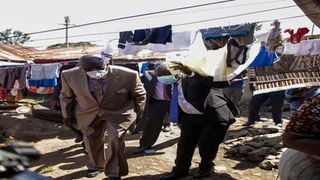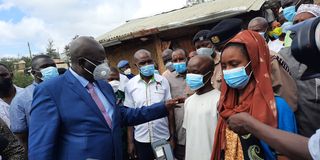
Education Cabinet Secretary Prof George Magoha at Nyalenda slums in Kisumu on August 25, 2021 when he led a multi-sectoral door-to-door campaign in the County to find 2020 KCPE candidates who haven't joined Form One yet.
| Tonny Omondi | Nation Media GroupCounties
Premium
Why Coast region is recording low school transition rates
While other regions have recorded between 80 and 90 per cent transition rates from primary to secondary, Coast is still lagging.
Some 63 per cent of the 2020 KCPE candidates in the region have joined secondary schools, with thousands yet to do so.
Poverty, rampant drug abuse, early marriages, illiteracy levels and teenage pregnancies are some of the factors cited for the low transition.
However, Education Cabinet Secretary George Magoha has dismissed poverty as an obstacle.
“Poverty is everywhere. It's the mindset. School is the best place for children. We shall take them to school, we don't want learners idling at home," the CS told the Nation in an interview.
Education stakeholders in the region are perturbed by the status quo and have urged the six governors - Hassan Joho (Mombasa), Amason Kingi (Kilifi), Dhado Godhana (Tana River), Granton Samboja (Taita Taveta), Fahim Twaha (Lamu) and Salim Mvurya (Kwale) - to mop up learners who are yet to join secondary schools and give them bursaries.

Education Cabinet Secretary George Magoha leading a multi-sectoral door-door campaign in Jomvu sub-county in Mombasa to trace learners who are yet to join secondary schools.
"At the moment Covid-19 has hit had the region already ravaged by perennial poverty. Local professionals have taken a back seat on matters of education,” said Coast scholar Philip Mbaji.
“They only make technical appearances at home, mostly during festivities like Christmas, New Year and Idd-ul-Fitr then they take off to urban centres.
"The local leaders are businessmen with wanting education standings, who can't talk about matters academic at public events because of their limited understanding of education matters."
However, he lauded several educated leaders like Kilifi North MP Owen Baya and Governor Mvurya who he said are gradually changing the narrative.
"But they are facing challenges from their peers. An elected leader moved a boy from Nairobi School to a local village school, where he supported him with a Sh5,000 bursary but the student got a C+," he revealed.
Education activist Esha Awadh blamed parental irresponsibility and ignorance in matters of education.
"Boys have dropped out of school to engage in the boda boda business, earning Sh500 daily, while girls have resorted to getting married yet parents are unbothered. They don't value education," she said.
Recently, Technical University of Mombasa Vice-Chancellor Laila Abubakar also decried low education levels in the region.
Prof Abubakar, the first woman vice-chancellor from the region, urged Coast parents to set good examples for their children so they can excel in their education.
"Most of our students come from humble backgrounds and they do not know about the available opportunities," she said.
Changamwe MP Omar Mwinyi, a former teacher, urged students to work hard in their studies and advised parents to make their children's education a top priority.
But he expressed regret that the region faces a myriad of challenges in education.
"We must rectify our situation in the Coast. Drug abuse is rampant," he said.
Dr Muinga Chokwe blamed socio-cultural challenges affecting education in the region.
"Leaders don't emphasise education. Teenage pregnancy is also a challenge in this region. Education has not been prioritised at all," said Dr Chokwe.
In Kwale, parents blamed extreme poverty for their failure to educate their children beyond primary school.
The county leads in the number of children who are yet to join Form One.

Education CS George Magoha (2nd left) who has directed Ministry officials to trace all the 2020 KCPE candidates who are yet to join Form One and ensure they go to school.
Six out of 10 candidates who sat the KCPE exam had not been accounted for.
But Prof Magoha warned residents against blaming poverty as the reason for failing to embrace education.
"Poverty is everywhere. People at the Coast should take education seriously. With the county and constituency bursary funds, why should a child remain at home?" he said.
Matuga Assistant County Commissioner Paul Oyara has said that about 600 pupils in the sub-county could not be accounted for.
He said that due to poverty, most parents cannot afford school fees while others cannot afford school uniforms, opting to keep their children at home.
“For those that we have found, we have spoken to school heads to allow them to be in school without uniforms," he said
Mr Oyara said poverty had pushed some parents to allow their children to do menial jobs to supplement the family income instead of taking them to school.
“The children have turned to the charcoal and fish business. Others are washing people’s clothes while others have turned into boda boda operators to help their parents,” he said.
This, he said, equally happens to girls who have become pregnant while in school. Some of the families of the defilers use kangaroo courts and pay off the families of the girls.
Kwale County Commissioner Joseph Kanyiri said village elders or people involved in the kangaroo courts are doing so against the law, and urged that such cases be reported to the police.
In Kilifi, Coast Regional Coordinator John Elungata has directed chiefs and their assistants to identify children who have not joined secondary schools and help them.
Mr Elungata said 63 per cent of KCPE candidates had joined Form One in the Coast region.
Kilifi County Commissioner Kutswa Olaka said 12,827 children had not reported to school and could not be accounted for.
Some 35,857 children sat the 2020 KCPE exams.






